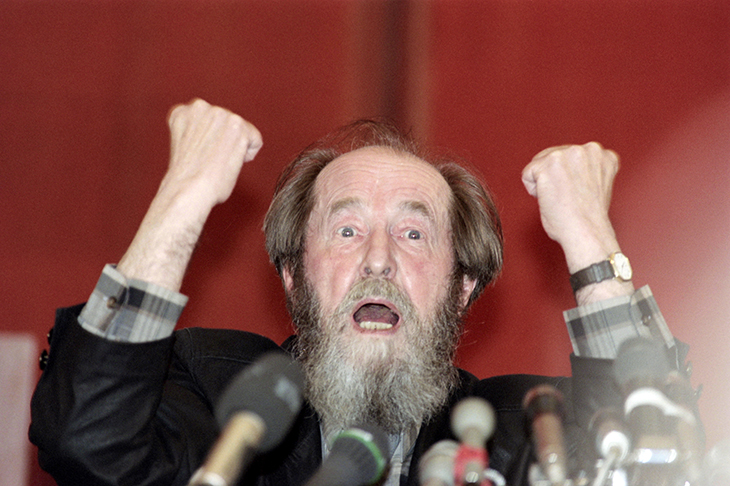Trudging through heavy snow along the perimeter of the Maple Avenue Cemetery, my steps are punctuated irregularly by shotgun blasts from the deer hunters in the nearby woods. Why did I wear this cervine-tawny jacket? I gaze up into the slate sky of a late November twilight and think… well, my first thought is that I hope these guys are good shots, local boys and not city hunters. My second thought is of Aleksandr Solzhenitysn, the long loneliness of exile, and the sustaining dream of repatriation.
‘Away from home in a country far away
Even the springtime sun is gray.’
Or so Solzhenitsyn wrote as he dreamed of his return. In one of the great and inspiriting publishing events of recent years, the University of Notre Dame Press will be bringing out most of the previously untranslated works of the Russian Nobelist and noblest Russian, including the just-published Between Two Millstones: Sketches of Exile, 1974-1978.
There’s enough literary score-settling in this one to satisfy a midcentury Partisan Review controversialist, but its pith, at least to this revenant, is Solzhenitsyn’s gnawing longing for home and, somewhat surprisingly, his causticity toward those whose expatriation was voluntary. Emigrants from Russia, he says, were ‘like a tree branch that had been separated from its trunk. Such is the curse of life away from one’s people.’ In ‘rushing off to America and Europe in search of the easy life, away from Russian sorrows,’ they had chosen downy pillows over hard lodgings, and something inside of them had just died.
I don’t know if this is relevant, to use a Sixties word, to the emigres of our own scattering age, though our rulers might profit from this injunction of Solzhenitsyn’s:
‘The aims of a great empire and the moral health of the people are incompatible. We should not presume to invent international tasks and bear the cost of them so long as our people is in such moral disarray.’
The Soviets at whom he directed this were as obdurately indifferent as Bushes and Clintons to the moral health of their countrymen and the corrosive effects of empire. There is a smarty-pants, rustic-despising clerisy in every country in the world, and ’tis far better for the soul — if not one’s bank account or, in Solzhenitsyn’s case, one’s liberty — to be an opponent thereof than a collaborator:
‘I am much more of a democrat than the New York intellectual elite or our dissidents are: in my view, democracy means the genuine self-government of the people, from the bottom up, while these people see it as being the rule of the educated classes.’
Thus he admires the Swiss cantonal system, and the human-scale direct democracy he would find in the town meeting government of his American haven in Vermont, and upon which he would draw in proposing a ‘democracy of small areas’ in his prescriptive Rebuilding Russia (1991).
Solzhenitsyn’s first impression of New York City drips with a contempt that does any country boy proud:
‘We were then taken to New York and put up at the Americana Hotel on some unbelievably high floor, the only air in the room being pumped in by a machine, the view from the sealed windows hellish beyond belief. Deep down in the concrete canyons the streets teemed with cars as if with insects (a good third of them yellow — New York City cabs, it turned out), inhuman skyscrapers all around (sporting 70-foot-high cigarette billboards), and from the roofs, those that were below us, came unrelenting clouds of vapor (the byproduct of the cooling systems). No sooner had we settled in than a mighty storm broke out over the city, worthy of The Master and Margarita, and then a second storm. Even fearless Alya was alarmed, but I told her not to worry, that according to popular lore storms were a good sign. “God’s mercy embraces even such an inhuman monstrosity.” I cannot imagine an uglier city.’

























